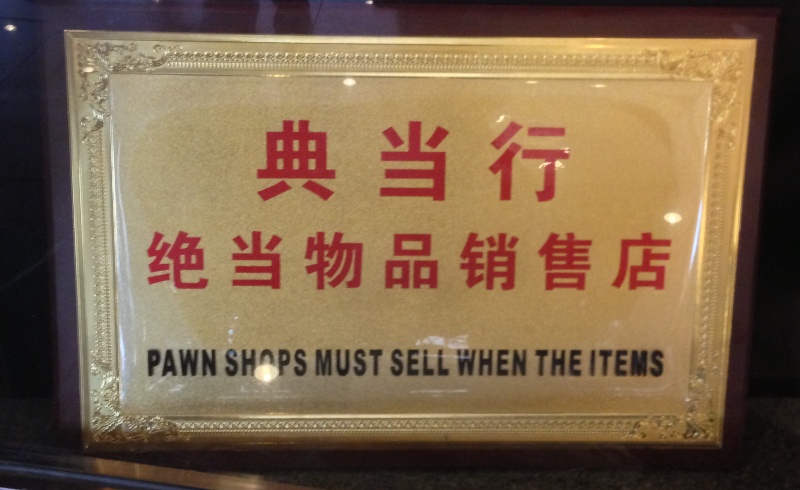Pawn shops must sell when the items
Language Log 2013-04-11
Joe Abley is in Beijing this week attending the 46th ICANN (Internet Corporation for Assigned Names and Numbers) meeting, and this sign appears in the window of one of the polished, expensive-looking boutiques within the Beijing International Hotel:
This would appear to be a robot translation derived from a slight rearrangement of a word-for-word rendering:
diǎndàng háng 典当行 ("pawn business/firm")
jué 绝 ("must")
dāng 当 ("when")
wùpǐn 物品 ("items")
xiāoshòu 销售 ("sell")
diàn 店 ("shop")
What the sign really says is this:
diǎndàng háng 典当行 ("pawn shop")
juédàng wùpǐn xiāoshòu diàn 绝当物品销售店 ("shop for the sale of goods that have been forfeited because the contract deadline has expired")
Character-by-character, that is:
jué 绝 ("cut off; sever")
dàng 当 ("pawn")
wù 物 ("thing")
pǐn 品 ("article")
xiāo 销 ("sell")
shòu 售 ("sell")
diàn 店 ("shop")
Each of these characters has many possible meanings, especially the first and second ones, but I've chosen only the meaning that is most appropriate for this sentence.
In premodern China, as revealed in traditional fiction, pawn shops were called dàngpù 当铺, and the goods in them were divided into huódàng 活当 ("live pawn", which could be redeemed by the original owner) and sǐdàng 死当 ("dead pawn", which could no longer be bought back by the original owner). The traditional sǐdàng 死当 ("dead pawn") was like the modern term juédàng 绝当 ("severed / terminated / cut-off pawn") discussed above.
[Thanks to Gianni Wan, Cao Lin, and Cheng Fangyi]
